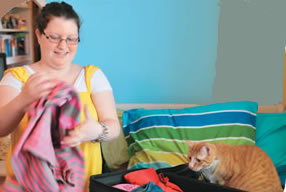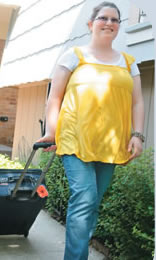Travel Savvy
Eleven Tips for Traveling with Cancer

You're all packed and ready to hit the road for vacation. You've sorted your toiletries and zipped them into plastic bags, just like airport security requires. You've packed a swimsuit -- and a sweater, for those chilly summer nights. You even remembered the camera this time.
But if you or a loved one has cancer, you should consider adding a few items to your travel checklist. We talked with experts at the University of Michigan Rogel Cancer Center -- health-care professionals and patients alike -- to get their tips for traveling after a cancer diagnosis. Here's what they had to say.
1. Talk to your doctor before you plan your trip.
If you're going through treatment, your doctor can help you determine whether you'll be in good enough shape for the trip you have in mind, said Thecla Jackson, a Cancer Center nurse. If you're a snowbird who's planning to be away for an extended period, tell your doctor's office how to reach you.
2. Pack your medical records.
Heather Kornick, a 23-year-old camp counselor who has adrenal cancer, said she carries a binder with photocopies of her medical records when she travels. She also tells friends traveling with her about the binder so they know to bring it to the hospital if an emergency arises.
3. Check your health insurance.
Find out what coverage you have in case you need to visit a doctor while you are away. Be sure to bring your proof of insurance, too.
4. Do you need shots?
Certain countries require special vaccines before traveling there. Ask your doctor whether they are appropriate for you.
5. Get a doctor's note.
Tighter airline security may require you to carry a letter from your doctor if you have metal in your body as a result of surgery or if you need to take certain medical supplies, such as syringes, on board. Call your clinic well in advance to get a letter from your doctor.
6. Don't put medications in checked bags.
Be sure to keep medications with you at all times. If your luggage gets lost, you don't want to lose your medicine, too. Security regulations allow prescription and over-the-counter medications to exceed the 3.4 ounce limit required for other liquids, gels and aerosols in carry-ons.
7. Request an airport wheelchair.
Airports are big, exhausting places. Save your energy for your destination. Kornick says she always requests a wheelchair. Even though she can walk, it can be draining to stand in lines or make long treks to gates -- particularly considering that gates often change.
8. Practice good airplane health.
Stay hydrated by drinking plenty of water and avoiding caffeine and alcohol. Get up and stretch during long flights to prevent blood clots. If you have had surgery that affected lymph nodes, consider a compression garment to reduce the risk of lymphedema, chronic swelling that can occur as a result of damage to lymph nodes.
9. Find a local health-care provider.
If you're planning to be away for several weeks, find a local doctor who can help coordinate your care. That way, if there's a problem, your U-M doctors can communicate with the local physician and possibly resolve issues more easily. Otherwise, Jackson said, your U-M doctor will probably advise you to go to the closest emergency room or urgent care center. Find out where it is when you get to town, just in case.
10. Save adventure travel for another time.
If your immune system is weakened by treatment, be a little more cautious than you normally would during your trip. Skip roadside food carts for better established restaurants. Drink bottled water. Carry hand sanitizer and wash your hands frequently.
11. Take your time getting there.

Kornick travels frequently from her home in Elk Grove, Ill., to Ann Arbor for treatment for adrenal cancer. She and her family have learned to schedule plenty of extra time for the five-hour drive so they can take breaks and trade off driving. If Kornick is traveling by air, she also allows extra time to keep stress levels low. "I know I need more time to do things now than other people," she says.
Travel Savvy: Resources
Here are some resources to help you plan your next trip
Transportation Security Administration
Get the full scoop on what to expect at airport security.
Centers for Disease Control and Preventions Travelers' Health
Find out what vaccines and other precautions to take before traveling abroad. It includes a link to a list of destination-specific health information.
American Medical Association Doctor Finder
If you'll be away from home for several months, consider establishing a relationship with a local doctor. This nationwide search engine can help you find potential doctors, but be sure to check with your insurance company first to see if the practice is covered by your plan.
Trip Advisor
Want to make doubly sure that the hotel you book is clean and safe? Check out user reviews on this site.
Read the Summer, 2010 issue of Thrive.
